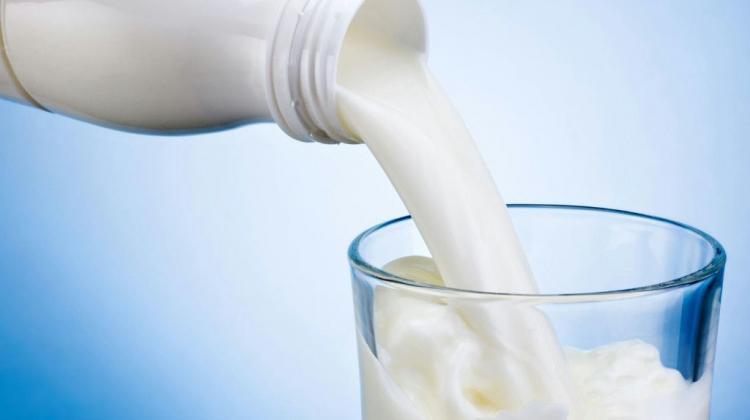Experts: Cow`s milk protein allergy is a serious disease
 Photo: Fotolia
Photo: Fotolia
Cow`s milk protein allergy is not a minor ailment, it is a serious disease. If untreated early and properly, it can pave the way for other serious illnesses, experts argued during a debate in Warsaw.
The theme of the debate was: "Milk allergy - a transient problem of infancy or a harbinger of further diseases". The data presented during the discussion show that food allergies occur in 9-10% children. One of the most common food allergens is cow`s milk protein, to which 3% newborns and babies are allergic.
National paediatric gastroenterology consultant Prof. Mieczysława Czerwionka-Szaflarska warned against underestimating child`s food allergies, especially the cow`s milk protein allergy. "It`s not just a minor ailment, it is a serious disease" - she emphasized. Along with other experts, she warned that if the allergy is not sufficiently early and properly treated, at a later age of the child it may also pave the way for other allergic diseases, such as atopic dermatitis, bronchial asthma and allergic rhinitis. This especially applies to IgE-mediated allergy, which consists in the immune system producing IgE antibodies specific for cow`s milk proteins.
Allergy to cow`s milk protein usually has a mild, moderate form - explained Prof. Piotr Albrecht, head of Department of Pediatric Gastroenterology and Nutrition of the Medical University of Warsaw. "In 90 percent children, food allergy usually disappears in the period from 2 to 4 years of age. However, if it is poorly treated, it threatens the development of the so-called allergic march, that is, the emergence of other allergic diseases" - he stressed.
Experts emphasized the importance of early detection of food allergy. Its symptoms may include eczema and skin rashes, diarrhoea, vomiting, constipation and gastro-oesophageal reflux, as well as respiratory ailments manifested by wheezing, coughing or sneezing, difficulty breathing, runny nose and swelling of the nose. "Children affected by this type of allergies sometimes scratch all day, sleep badly and become nervous" - emphasized Prof. Albrecht. Some babies do not have serious symptoms, they only refuse to take food.
Cow`s milk protein allergy, especially in its mild and moderate form, can be diagnosed by a primary care physician. "A primary care physician can also prescribe allergy preparations that are refunded from the budget" - said Prof. Czerwionka-Szaflarska. The administration of such preparations, instead of the elimination diet, difficult to implement in the case of cow`s milk protein, allows to avoid nutritional deficiencies.
The expert emphasised that when a child receives milk for allergy sufferers, it should not be referred to a specialist, for example an allergist, because the specialist will not be able to diagnose anything. In any case, only children with severe food allergies, which in extreme cases may even lead to anaphylactic shock (life-threatening significant reduction in blood pressure), should be referred to specialists.
Head of the Chair and Clinic of Allergology and Clinical Immunology and Internal Diseases of the Nicolaus Copernicus University in Toruń, Collegium Medicum in Bydgoszcz Prof. Zbigniew Bartuzi noted that in some cases cow`s milk protein allergy may not be related to IgE antibodies. It causes similar symptoms, such as diarrhoea, flatulence, intestinal discomfort, but they usually appear later (from 1 hour to a few days after exposure to cow`s milk protein).
The specialist warned that one should not use so-called alternative allergy tests, such as iridology and hair testing, to detect allergies. "They are not reliable and do not allow to make the correct diagnosis" - he stressed. He added that if they were useful, allergists would be using them. Doctors use so-called spot tests to check individual substances that may be sensitising.
Food allergy is also confused with food intolerance, caused by deficiency or lack of enzymes necessary for the proper digestion of nutrients. In the case of cow`s milk, some people lack the enzyme (lactase) or it is not fully functional in the breakdown of lactose (disaccharide in the milk of mammals).
According to Prof. Bartuzi, 30-35 percent Poles are cow`s milk intolerant, and some symptoms, such as stomach aches, bloating and diarrhoea in the form of foamy stools, may be similar to cow`s milk protein allergy. He noted that the age, at which cow`s milk tolerance appears, has been moved. In the 1990s, in 75 percent people it developed at the age of 5, and now on average at around 16 years of age. However, in an increasing number of people, it develops only during adulthood, or does not develop at all" - he explained.
Allergies are becoming more and more common. According to the World Allergy Organization (WAO), 30-40 percent world population has at least one allergic disease, especially in the most industrialized countries. The Polish Allergy Society estimates that nearly half of Poles are affected by allergies.
PAP - Science in Poland, Zbigniew Wojtasiński
zbw/ ekr/ kap/
tr. RL
Przed dodaniem komentarza prosimy o zapoznanie z Regulaminem forum serwisu Nauka w Polsce.

















